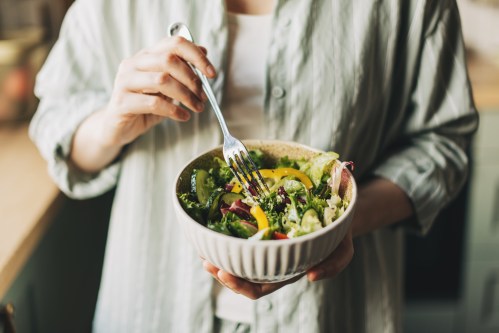Although coffee is a daily staple year-round for many, can we agree that it tastes a little different and, dare we say, better during the fall months? Perhaps this is because of the extra pump (or five) of pumpkin spice syrup that we have no choice but to order the moment PSLs are back in stock… or that cinnamon caramel cookie butter creamer we keep stocked in the fridge starting September 1st. Swoon.
Experts in This Article
Of course, there’s absolutely nothing wrong with indulging in these deliciously sweet ways to doctor up a drab cup of joe every so often. However, according to Kendra Haire, RDN, LD, a registered dietitian and Noom Coach, there are some simple steps you can take to give your favorite fall coffee drinks a flavorful glow-up that won’t exacerbate inflammation or throw your gut microbiome out of whack. (Scientific studies have repeatedly shown that added sugar can cause an inflammatory response on the body, which affects your brain, heart, gut—all of it.) Here, Haire spills the (coffee) beans on gut-friendly ways to jazz up your coffee order come fall.
Ways to add anti-inflammatory, gut-boosting benefits to your favorite fall coffee beverage
Before we jump in, know that you can apply these tips to tea-based beverages in addition to coffees. “You really can’t go wrong with either drink,” Haire says. Coffee is packed with essential nutrients (like magnesium and potassium) and tea can help support bone health as you age—and both beverages serve as great sources of antioxidants. But aside from these drinks having benefits of their own, they can be easily upgraded with help from a few fall-inspired ingredients, too.
1. Add flavorful anti-inflammatory fall spices
According to Haire, one of the best ways to add gut-healthy benefits to drinks (coffee and tea included) is by adding flavor-enhancing spices like cinnamon, clove, nutmeg, allspice, and ginger, which are jammed packed with loads of anti-inflammatory benefits. “While coffee has health benefits on its own, we get a boost of gut-friendly polyphenols by adding traditional fall spices like cinnamon, clove, nutmeg, and ginger,” Haire says.
PSL, cinnamon Americano, dirty chai? Though it’s hard to pick just one, Haire suggests that less sugar and more spice is an anti-inflammatory win (and digestion win, cinnamon is one of the top spices that make you poop) when it comes to fall drinks. “Coffee drinkers can enjoy espresso drinks with steamed milk and sprinkled with a variety of fall spices,” Haire explains. “Infusing your coffee with fall spices is a great gut-healthy way to add the seasonal flavors we love without the extra sugar.”
Ginger, for example, contains antioxidant compounds that neutralize free radical damage (which can lead to oxidative stress and inflammation), and allspice can help facilitate healthy digestion while potentially eliminating nausea, vomiting, and diarrhea. So, adding these to lattes and the like is a great way to load up on flavor and health benefits without experiencing a sugar crash.
2. Use plant-based milk
“For some people, dairy can create inflammation in the gut. If this applies to you, swapping out the milk for a dairy-free alternative—oat, coconut, or almond milk—can be helpful,” Haire says. Don’t know which one to pick? Check out some of the best plant-based creamers and how they compare nutritionally.
Haire adds that this applies to toppings, too, which is why she recommends forgoing whipped cream swirled on top of your bevvie, which can also increase inflammation from sugar intake.
3. Opt for naturally anti-inflammatory sweeteners
Avoiding sweeteners filled with sugar that can cause inflammation is top of mind for Haire when ordering at the coffee shop. While we can’t deny that embracing pumpkin spice-flavored everything is a non-negotiable at this time of year, she says that many PSL drinks are made with a hefty amount of added sugar. “You can avoid added sweeteners entirely, or simply ask for a minimal amount to be added when ordering out. Honey can also be a helpful swap for sugar. Although it is still a form of added sugar, it does have some beneficial anti-inflammatory properties to offer,” she says.
Like all things in life, consuming sugary treats in moderation is the way to go, as studies have repeatedly shown that added sugar is one of the leading foods that can cause inflammation—and that it has an especially damaging effect on the gut. “When it comes to added sugar and gut health, there’s still a lot we don’t know. But scientific studies do suggest that it promotes an inflammatory profile in the gut and damages the microbiome,” Will Bulsiewicz, MD, gastroenterologist and Fiber Fueled author, previously told Well+Good.
4. Choose a creamer that’s minimally-processed
“As a rule of thumb, it’s best to choose foods with ingredients that are minimally-processed,” Haire says. This means paying close attention to the food labels at the store. “Although everything is fine in moderation, if you are consuming a creamer on a daily basis, it’s best to scan the label for ingredients like hydrogenated oils, preservatives, or artificial colors and avoid them if you’re able,” she recommends. Don’t know what to look out for when creamer shopping? A food scientist shared a few of her favorite creamers with us for making the perfect creamy, dreamy cup of coffee.
One pumpkin spice latte coming right up:
Sign Up for Our Daily Newsletter
Get all the latest in wellness, trends, food, fitness, beauty, and more delivered right to your inbox.
Got it, you've been added to our email list.











